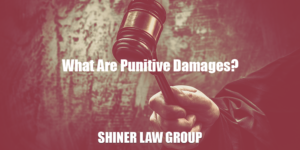
what are punitive damages, punitive damage settlements, punitive damage limitations
Punitive damages, or exemplary damages, are awarded in certain circumstances in addition to compensatory damages and typically awarded at the discretion of the Court and considered punishment when the behavior of a defendant is found to be dangerous or harmful.
The primary purpose behind punitive damages is to deter other companies and individuals from following negligent behaviors. Though the overall intent of imposing punitive damages is not to reward the plaintiff, the victim will receive the amount designated by the Court to punish the defendant.
Important Note:
- Punitive damages are paid by a defendant when found guilty by the Court for engaging in negligent behaviors and offenses.
- Damages are awarded as a punishment for gross negligence or intent and not as compensation to the injured.
- Punitive damages are awarded over compensatory damages to deter and hinder future violaters.
A Real Example of Punitive Damages
In a California case against Monsanto, a Bayer subsidiary, a verdict against the company was awarded to a couple who claimed to develop cancer as direct use of the company’s herbicide (weedkiller) called Roundup.
It was ruled the couple contracted non-Hodgkins lymphoma from their use of the herbicide containing the carcinogenic substance, glyphosate.
The couple received $55 million in compensatory damages and awarded $1 billion per person in punitive damages in the Rounup lawsuit.
This case is only a single account of the 13,000 lawsuits filed against Monsanto, Roundup’s maker.
How Are Punitive Damages Awarded?
Compensatory Damages Awards
To understand how punitive damages are awarded, you must first understand what compensatory damages are.
The purpose of a lawsuit is to allow a plaintiff to get back to the position he or she was in before an accident. If your vehicle was damaged in an accident and it was another person’s fault, it should be repaired. If you were injured during this accident, and this resulted in a loss of income or medical expenses, you should be compensated appropriately. You may also be awarded for pain and suffering as a result of injuries related to this accident under the law.
All of these damages are known as compensatory damages.
Punitive Damage Awards
Punitive damages do not give a plaintiff back anything lost from an accident but rather punish a defendant for egregious conduct.
The premise is to deter future similar conduct by anyone else through the public punishment of damages over and beyond compensatory damages.
Though punitive damage awards are for society’s benefit and the punishment of the guilty, and not necessarily the victim, punitive damages are paid to the plaintiff in a case.
Requirements For Punitive Damages
There are several factors that the Courts take into consideration before compensating for punitive damages. A couple of the most important:
- Was the defendant’s conduct worse than negligent, intentional, or reckless indifference to others’ rights?
- Were there other punitive damages awarded in similar cases?
Every state has different requirements for awarding punitive damages. Based on the state’s particular criteria will depend on the probability of receiving punitive damages.
Punitive Damage Considerations
There are specific guidelines set by the states and the Supreme Court in punitive damage considerations. The award amount of punitive damages do not typically exceed four times the amount of compensatory damages.
For example, if a plaintiff receives $50,000 in compensatory damages, they are likely to receive up to $200,000 in punitive damage awards.
The exception to this rule is if the defendant’s actions are particularly outrageous if the requested amount for punitive damages is lower than the injuries suffered or punitive damages were higher in similar cases.
Other considerations for more significant punitive damage amounts are given in circumstances when injuries require unknown long-term care, non-economic harm is challenging to determine, or the defendant’s conduct is unimaginably objectionable.
Punitive Damage Limitations
A defendant’s wealth is not a consideration for compensatory damage amounts. In contrast, punitive damages against higher wealth individuals and companies are considered and tend to be higher than less wealthy defendants.
In many states, there are limitations to the amount of punitive damages awards. For example, in Florida, punitive damages may not exceed three times compensatory damages awarded or $500,000. Suppose the defendant’s conduct was proven to be driven merely by monetary earnings, and the unreasonably hazardous conduct resulted in an increased likelihood of injury. In that case, the punitive damages award might not exceed four times the amount of compensatory damages or the sum of $2 million.
Other Examples of Punitive Damages
In a New Jersey case against Johnson & Johnson, Talcum Baby Powder users were awarded $37.2 million in compensatory damages for cancer-related issues due to asbestos exposure.
After the initial verdict for compensatory damages, a jury awarded an additional $750 million in punitive damages to the previous users of the Baby Powder. A judge later reduced this verdict to $186.5 million.
Hiring An Attorney To Help You
If you or a loved one find yourself in a situation where injuries occurred due to an accident that happened as a result of a negligent or intentional action of another, speak with a Shiner Law Group lawyer today. We can help seek justice for you on your behalf. Call us today at (561) 777-7700 or fill out our free online case evaluation.